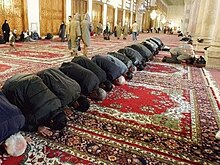Worship

| Part of a series on |
| Theism |
|---|
Worship is showing regard with great respect, honor, or devotion.[1] This may be encountered in religious settings. In such instances it may represent divine worship; reverence for a divine being or supernatural power. This activity may have other focuses, such as hero worship. Worship may involve one or more of activities such as veneration, adoration, praise, supplication, devotion, prostration, or submission. An act of worship can be performed as simple prayer or through elaborate ceremony, individually, in an informal or formal group, or by a designated leader. The focus of worship is ultimately honoring the subject in some manner.[2]
Etymology[edit]
The word is derived from the Old English weorþscipe, meaning "worship, honour shown to an object",[3] which has been etymologised as "worthiness" or "worth-ship" – in the sense of giving, at its simplest, value to something.[4]
Worship in various religions[edit]
Buddhism[edit]
Worship in Buddhism may take innumerable forms given the doctrine of skillful means. Worship is evident in Buddhism in such forms as: guru yoga, mandala, thanka, yantra yoga, the discipline of the fighting monks of Shaolin, panchamrita, mantra recitation, tea ceremony, ganacakra, amongst others. Buddhist Devotion is an important part of the practice of most Buddhists. According to a spokesman of the Sasana Council of Burma, devotion to Buddhist spiritual practices inspires devotion to the Triple Gem.[3] Most Buddhists use ritual in pursuit of their spiritual aspirations. In Buddhism, puja (Sanskrit & Pali: pūjā) are expressions of "honour, worship and devotional attention."[3] Acts of puja include bowing, making offerings and chanting. These devotional acts are generally performed daily at home (either in the morning or evening or both) as well as during communal festivals and Uposatha days at a temple.
Christianity[edit]
In Christianity, a church service is a formalized period of communal worship, often but not exclusively occurring on Sunday (or on Saturday in the case of those churches practicing seventh-day Sabbatarianism). The church service is the gathering together of Christians to be taught the "Word of God" (the Holy Bible) and encouraged in their faith. Technically, the "church" in "church service" refers to the gathering of the faithful rather than to the building in which the event takes place. In Christianity, worship is reverent honor and homage paid to God. The New Testament uses various words to express the concept of worship. The word proskuneo - "to worship" - means to bow down (to Gods or to kings).[3]
Mass is the central act of divine worship in the Catholic Church.[5] The Congregation for Divine Worship at the Vatican publishes a Directory on Popular Piety and the Liturgy.[6] Roman Catholic devotions are "external practices of piety" which are not part of the official liturgy of the Catholic Church but are part of the popular spiritual practices of Catholics.[3] They do not become part of liturgical worship, even if conducted in a Catholic church, in a group, in the presence of a priest.
Anglican devotions are private prayers and practices used by Anglican Christians to promote spiritual growth and communion with God. Among members of the Anglican Communion, private devotional habits vary widely, depending on personal preference and on affiliation with low-church or high-church parishes.
Adoration versus veneration[edit]

The New Testament uses various words translatable as "worship". The word proskuneo - "to worship" - means to bow down to Gods or kings.[7]
Roman Catholicism, Anglicanism, Oriental Orthodoxy, and Eastern Orthodoxy make a technical distinction between two different concepts:
- adoration or latria (Latin adoratio, Greek latreia, [λατρεία]), which is due to God alone
- veneration or dulia (Latin veneratio, Greek douleia [δουλεία]), which may be lawfully offered to the saints
The external acts of veneration resemble those of worship, but differ in their object and intent. Protestant Christians, who reject the veneration of saints, question whether Catholics always maintain such a distinction in actual devotional practice, especially at the level of folk religion.
According to Mark Miravalle the English word "worship" is equivocal, in that it has been used (in Catholic writing, at any rate) to denote both adoration/latria and veneration/dulia, and in some cases even as a synonym for veneration as distinct from adoration:
As St. Thomas Aquinas explains, adoration, which is known as latria in classical theology, is the worship and homage that is rightly offered to God alone. It is the manifestation of submission, and acknowledgement of dependence, appropriately shown towards the excellence of an uncreated divine person and to his absolute Lordship. It is the worship of the Creator that God alone deserves. Although we see in English a broader usage of the word "adoration" which may not refer to a form of worship exclusive to God—for example, when a husband says that he "adores his wife"—in general it can be maintained that adoration is the best English denotation for the worship of latria.
Veneration, known as dulia in classical theology, is the honor and reverence appropriately due to the excellence of a created person. Excellence exhibited by created beings likewise deserves recognition and honor. We see a general example of veneration in events like the awarding of academic awards for excellence in school, or the awarding of olympic medals for excellence in sports. There is nothing contrary to the proper adoration of God when we offer the appropriate honor and recognition that created persons deserve based on achievement in excellence.
We must make a further clarification regarding the use of the term "worship" in relation to the categories of adoration and veneration. Historically, schools of theology have used the term "worship" as a general term which included both adoration and veneration. They would distinguish between "worship of adoration" and "worship of veneration." The word "worship" (in a similar way to how the liturgical term "cult" is traditionally used) was not synonymous with adoration, but could be used to introduce either adoration or veneration. Hence Catholic sources will sometimes use the term "worship" not to indicate adoration, but only the worship of veneration given to Mary and the saints.[8]

Orthodox Judaism and orthodox Sunni Islam hold that for all practical purposes veneration should be considered the same as prayer; Orthodox Judaism (arguably with the exception of some Chasidic practices), orthodox Sunni Islam, and most kinds of Protestantism forbid veneration of saints or of angels, classifying these actions as akin to idolatry.
Similarly, Jehovah's Witnesses assert that many actions classified as patriotic by Protestant groups, such as saluting a flag, count as equivalent to worship and are therefore considered idolatrous as well.[9]
Quaker Meeting for Worship[edit]
Quakers (the Religious Society of Friends) have both unprogrammed and programmed Meetings for Worship. Unprogrammed worship is based on silence and inward listening to the Spirit, from which any participant may share a message. In unprogrammed meetings for worship, someone speaks when that person feels that God/Spirit/the universe has given them a message for others. Programmed worship includes many elements similar to Protestant services, such as a sermon and hymns. Many programmed meetings also include a time during the service for silent, expectant waiting and messages from the participants.
Hinduism[edit]
Worship in Hinduism involves invoking higher forces to assist in spiritual and material progress and is simultaneously both a science and an art. A sense of bhakti or devotional love is generally invoked. This term is probably a central one in Hinduism. A direct translation from the Sanskrit to English is problematic. Worship takes a multitude of forms depending on community groups, geography and language. There is a flavour of loving and being in love with whatever object or focus of devotion. Worship is not confined to any place of worship, it also incorporates personal reflection, art forms and group. People usually perform worship to achieve some specific end or to integrate the body, the mind and the spirit in order to help the performer evolve into a higher being.[10]
Islam[edit]

In Islam, worship refers to ritualistic devotion as well as actions done in accordance to Islamic law which is ordained by and pleasing to God. Worship is included in the Five Pillars of Islam, primarily that of salat, which is the practice of ritual prayer five times daily.
According to Muhammad Asad, on his notes in The Message of the Qur'an translation on Q51:56,
Thus, the innermost purpose of the creation of all rational beings is their cognition of the existence of Allah and, hence, their conscious willingness to conform their own existence to whatever they may perceive of His will and plan: and it is this twofold concept of cognition and willingness that gives the deepest meaning to what the Quran describes as "worship". As the next verse shows, this spiritual call does not arise from any supposed "need" on the part of the Creator, who is self-sufficient and infinite in His power, but is designed as an instrument for the inner development of the worshipper, who, by the act of his conscious self-surrender to the all-pervading Creative Will, may hope to come closer to an understanding of that Will and, thus closer to Allah Himself.[11]
In the Muslim world, the word worship (in the literal context of worshipping) is forbidden to be used if it refers to an object or action and not exclusively to Allah.[12]
Judaism[edit]
Worship of God in Judaism is called Avodat Hashem. During the period when the Temple stood, the rites conducted there were considered the most important act of Jewish worship.[13] However, the most common form of worship was and remains that of prayer. Other forms of worship include the conduct of prescribed rituals, such as the Passover Seder and waving the Four Species, with proper intent, as well as various types of Jewish meditation.
Worship through mundane activities[edit]
Jewish sources also express the notion that one can perform any appropriate mundane activity as the worship of God. Examples would include returning a lost article and working to support oneself and one's family.
The Code of Jewish Law (Orach Chayim, Chapter 231) cites Proverbs (3:6), "in all your ways, know him" (Hebrew: בכל דרכיך דעהו (b'chol d'rachecha dei'eihu)), as a biblical source for this idea.
Sikhism[edit]
In Sikhism, worship takes place after the Guru Granth Sahib, which is the work of the 10 Sikh Gurus all in one. Sikhs worship God and only one God, known as "One Creator", "The Wonderful Teacher" (Waheguru), or "Destroyer of Darkness".
Wicca[edit]
Wiccan worship commonly takes place during a full moon or a new moon. Such rituals are called an Esbat and may involve a magic circle which practitioners believe will contain energy and form a sacred space, or will provide them a form of magical protection.[14]
Zoroastrianism[edit]
Prayer is one of the duties and worships of Mazdayasna, which is performed in order to always pay attention to the religious commandments and to give thanks to Ahura Mazda (God).
Modern worship[edit]
In modern society and sociology, some writers have commented on the ways that people no longer simply worship recognised deities, but also (or instead) worship consumer brands,[15] sports teams, and other people (celebrities, for example).[16] Sociology therefore extends this argument to suggest outside of a religion worship is a process whereby society worships itself, as a form of self-valorization and self-preservation.[17]
Types[edit]
- Ancestor veneration
- Animal worship
- Idolatry, worship of idols
- Imperial cult
- Nature worship
- Ceremonial pole
See also[edit]
- Intercession
- Major world religions
- Sacrifice - an offering of propitiation or of worship
References[edit]
- ^ merriam-webster.com/dictionary/worship
- ^
Fergusson, David (September 2008). "The Theology of Worship: A Reformed Perspective". In Forrester, Duncan B.; Gay, Doug (eds.). Worship and Liturgy in Context: Studies and Case Studies in Theology and Practice. Norwich: Hymns Ancient and Modern Ltd (published 2008). p. 71. ISBN 9780334041689. Retrieved 28 December 2018.
The English term 'worship' itself derives from an Anglo-Saxon word for 'honour' (weorthscipe) suggesting again that worship is an action honouring one who is worthy.
- ^ a b c d e Bosworth and Toller, Anglo-Saxon Dictionary, "weorþscipe"
- ^ Cf. Kay, William K., Religion in education, Gracewing Publishing, 1997, p. 77, ISBN 0-85244-425-7.
- ^ Hardon, John. "Modern Catholic Dictionary". Catholic Culture.
- ^ "Directory on popular piety and the liturgy: Principles and guidelines". The Holy See. December 2001.
- ^ Called to Worship: The Biblical Foundations of Our Response Vernon Whaley - 2009 - In the Greek, the word for worship, proskuneo, means to express deep respect or adoration—by kissing, with words, or by bowing down. Associated words include epaineo, "to commend or applaud"; aineo, "to praise God"; and sebomai.
- ^ Miravalle, Mark (November 24, 2006). "What Is Devotion to Mary?". www.motherofallpeoples.com. Mother of all peoples. Retrieved November 2, 2013.
- ^ Mitchell K. Hall (2009), Vietnam War Era : People and Perspectives, ABC-CLIO, 2009, p. 97.
- ^ "Worship", Krishna Maheshwari, Hindupedia, the online Hindu Encyclopedia
- ^ Muhammed Asad (Leopold Weiss) (2003). The Message of the Quran. p. 918.
- ^ Ljakić, Zijad. "Upotreba riječi "obožavam"" [Use of word "[I] worship"]. n-um.com (in Bosnian). Archived from the original on 2019-09-03. Retrieved 2019-09-03.
- ^ Shmuel Safrai, Centrality of the Temple during the Second Temple period (Hebrew)
- ^ Living Wicca: A Further Guide for the Solitary Practitioner - Page 114, Scott Cunningham - 1993
- ^ Milian, Mark (May 19, 2011). "Apple triggers 'religious' reaction in fans' brains, report says". CNN. Retrieved December 20, 2023.
- ^ "News - The University of Sydney". sydney.edu.au.
- ^ "Emile Durkheim - The Sociology of Religion". www.cf.ac.uk.
